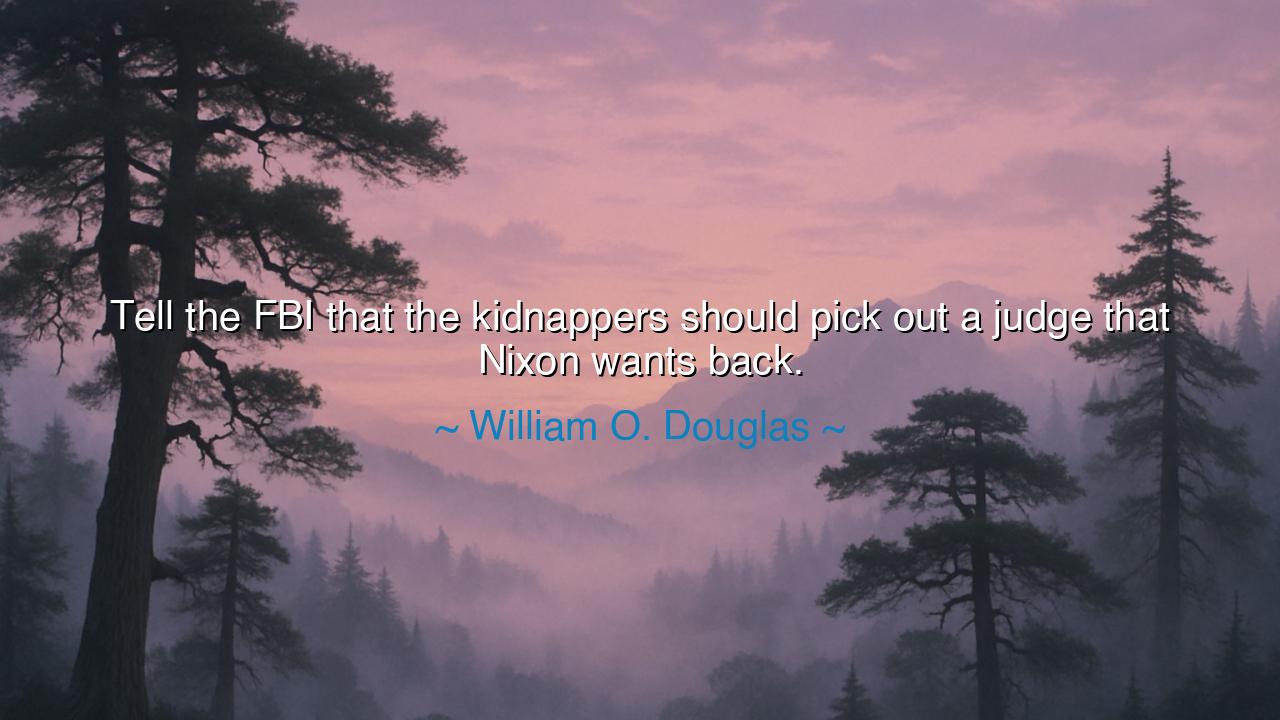
Tell the FBI that the kidnappers should pick out a judge that






“Tell the FBI that the kidnappers should pick out a judge that Nixon wants back.” Thus spoke Justice William O. Douglas, a man of fierce independence and unshakable wit, whose words, though veiled in jest, cut to the heart of political corruption and the peril of power. This sentence, half humor and half rebuke, emerged during a time of deep turmoil in the American republic — the era of President Richard Nixon, whose shadow of secrecy and ambition fell even upon the courts themselves. Douglas’s words, though brief, are a defense of the eternal principle that justice must stand apart from power, and that even the mightiest of rulers must bow before the law, not command it.
To understand the meaning of this quote, one must recall the time in which it was spoken. It was during the early 1970s, when Nixon’s administration was embroiled in scandal, surveillance, and intrigue — the years that would later culminate in Watergate. Nixon had long viewed the Supreme Court as a battlefield for ideology, seeking to shape it to his political will. Justice William O. Douglas, one of the most liberal and outspoken members of the Court, was a frequent target of Nixon’s wrath. The President and his allies had even sought to have Douglas impeached, accusing him of improprieties that were, in truth, the punishments of independence. Against such pressure, Douglas remained steadfast. So when reports surfaced that extremists had threatened to kidnap judges, he uttered this line — “Tell the FBI that the kidnappers should pick out a judge that Nixon wants back.” It was sarcasm sharpened into swordplay: a defiant challenge to the President’s hypocrisy.
Beneath the humor lies a truth ancient and enduring. Tyrants fear the law that they cannot bend, and thus seek to shape it into a servant of their will. But a true judge, like a true philosopher, belongs not to any ruler, party, or creed — he belongs to justice itself. Douglas’s quip mocked Nixon’s attempts to control the judiciary, reminding the world that justice cannot be “picked out” like a pawn on a chessboard. His jest revealed a deeper moral: that corruption often cloaks itself in patriotism, and that even in democracies, the hunger for domination seeks to disguise itself as order. Douglas stood as the voice of conscience, speaking truth to power with the fearless irony of one who serves no master but the Constitution.
Consider this lesson in the mirror of history. When Thomas More, the English chancellor of old, refused to betray his conscience to King Henry VIII, he too used wit to defy tyranny. “I die the king’s good servant, but God’s first,” he said before his execution. Like More, Douglas knew that humor can sometimes pierce the armor of oppression more swiftly than anger. His remark was no mere jest; it was a blow struck in the long struggle between law and power, the same struggle that has raged since the dawn of civilization. Every empire, every nation, faces this test: will its judges serve the people, or the throne?
Douglas’s remark also exposes the fragility of freedom when cynicism and corruption infect authority. The very idea that a president might “want back” a judge reveals a temptation as old as Caesar — to rule not through justice, but through control. Yet history shows that the strength of a republic lies not in its armies or wealth, but in its willingness to restrain its own power. For when rulers begin to select which laws they obey and which judges they favor, the structure of liberty begins to decay. In the laughter of Douglas’s words, we hear a warning: that even the laughter of the wise is born from grief at the folly of men.
And yet, his message is not one of despair, but of moral vigilance. Douglas reminds us that resistance to corruption need not always shout; sometimes, it can whisper with humor, piercing arrogance with irony. In every age, those who serve truth must find their voice — whether in protest, in art, or in satire — to expose the falsehoods of the powerful. Courage does not always wear armor; sometimes it wears a smile. Douglas’s courage was the courage of the mind, the bravery to speak even when silence was safer, to jest even when the jest carried the weight of defiance.
So, my children, learn this from the words of William O. Douglas: never surrender the independence of your conscience to the favor of those in power. Whether you are judge, worker, or scholar, hold your integrity as the highest law. Laugh in the face of tyranny, for laughter born of truth is stronger than fear born of obedience. And when the world tempts you to trade conviction for comfort, remember the justice who dared to mock a president and say, “Tell the kidnappers to take one he wants back.” For in that one jest, the eternal voice of freedom speaks — clear, courageous, and unyielding.






AAdministratorAdministrator
Welcome, honored guests. Please leave a comment, we will respond soon